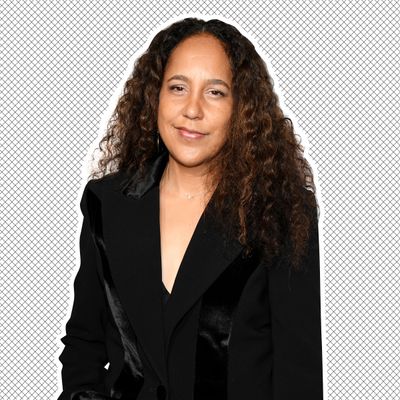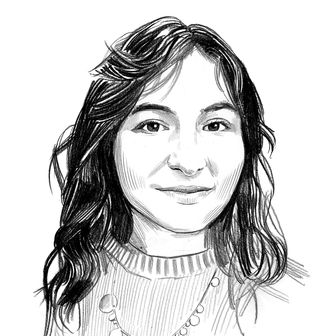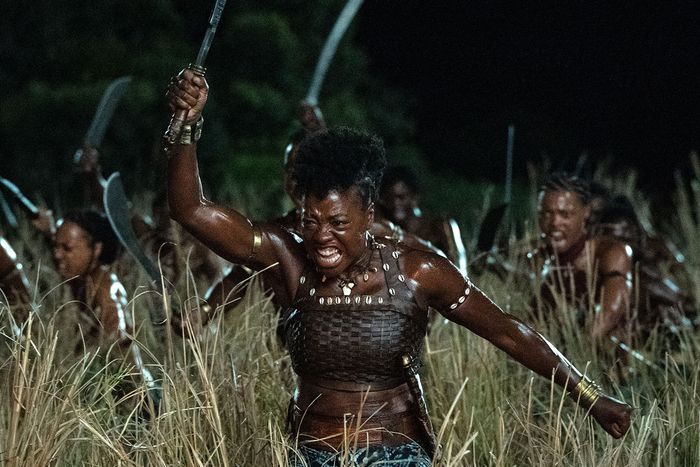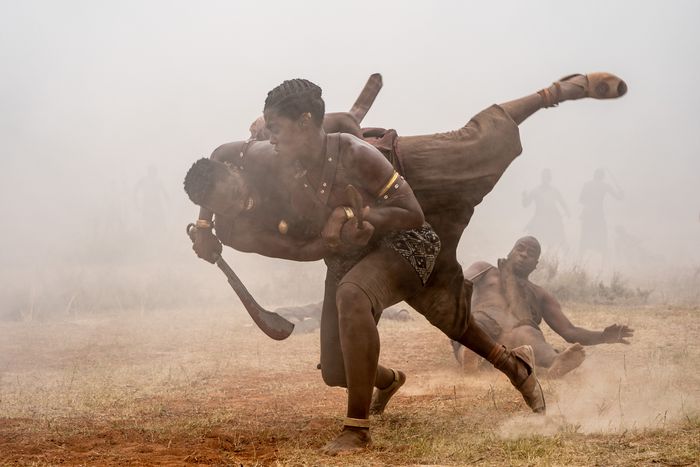
You probably know Gina Prince-Bythewood as the writer-director of one of the most beloved romance stories of the early aughts: the 2000 film Love & Basketball. Which means you might have been just as surprised as I was to see her name, 20 years later, attached to a superhero movie. 2020’s The Old Guard, which Prince-Bythewood directed, turned out to be everything the genre was not: grounded, deeply emotional, and offering a whole new vision for who gets to be an action star. In The Woman King, which hit theaters last week, Prince-Bythewood is taking up that mantle again.
“The irony,” Prince-Bythewood says, “is that Love & Basketball got me into the room for The Old Guard.” She’d been slowly building up an action résumé — a Marvel pilot here, a Spider-Man spinoff there — but The Old Guard’s writers wanted her to infuse their story of a band of immortal warriors who fight for underdogs with the character development that made Love & Basketball great. Obviously, it worked. And her knack for the small, personal stories that make a movie memorable — even one where a bunch of people get beat up — is just as clear in The Woman King, which she calls “intimately epic.”
Starring Viola Davis and Thuso Mbedu, The Woman King is a historical drama about the all-female army that defended West Africa’s Kingdom of Dahomey for centuries. It’s filled with a lot of the same elements that made The Old Guard feel like a much-needed breath of fresh air: distinctly un-CGI-ed set pieces, heroes who look and sound nothing like the ones we usually see on screen, and interpersonal drama that feels just as significant as the action. Prince-Bythewood hopes it can change the landscape of action movies the way Wonder Woman or Black Panther did, and prove yet again that straight white men aren’t the only characters people will pay good money to see in an epic fight. It’s no coincidence that she shot The Woman King’s biggest battle a lot like the army-clashing scenes in Gladiator and Braveheart. She’s offering a new vision for action where an army of dark-skinned Black women is just as likely to be sprinting into battle as, say, Russell Crowe.
The Woman King is your second action project. What made you want to make films that fall under that genre?
I love action. I grew up an athlete, and I love the David-and-Goliath narrative, rooting for the underdog and heroes against villains. Women are never in that genre. I also loved the direction the action genre was going, in terms of trained actors being part of these films and giving us beautiful characters that infuse the action. I love that you can have that much depth in an action film, and I wanted to be a part of it.
A couple years ago I turned my thinking from “I wish I could do that” to “I’m going to do that.” The first step was Marvel’s Cloak and Dagger, a pilot that I shot which then got me into that world. That led to getting in the room of Silver and Black, which didn’t ultimately go to series, but I learned a tremendous amount. Suddenly, the industry had the perception of me: Oh, she can do that. And that led to getting in the room for The Old Guard. Actually, the irony is that Love & Basketball got me into that room, because they wanted that type of character development for the film.
Action movies tend to be pretty hypermasculine and bro-y. The Old Guard and The Woman King, which both put Black women in the middle of the action, feel like very deliberate challenges to who we get to see onscreen.
This narrative that women can’t be warriors or fighters or have courage makes no sense. I learned from watching films like Gladiator, The Last of the Mohicans, Braveheart, and this is about, How do I add my own vision to this? I think women can rival all of them. The miracle of The Woman King is that this story has never been told before, whereas now we’ve gotten a couple versions of the history that was happening in Braveheart.
There’s a bathroom fight in Mission Impossible 6 that’s one of the greatest action scenes ever, and I hope people get hyped by the plane fight in The Old Guard or the big battle in The Woman King the same way I get hyped watching that bathroom scene. These are big, epic fights, and they need to be kick-ass enough to appeal to everyone.
Both The Old Guard and The Woman King have B-plot romances that feel really significant and moving but don’t overtake the main story. As someone with a romance screenwriting background, how do you approach those arcs?
I think the best love stories aren’t the main story. It’s hard to sustain just two people in love. What I learned from the big, historical epics that influenced The Woman King was that it can’t just be two armies clashing and hacking at each other. What’s the story beneath that, and how do you follow it within the chaos? I knew I wanted The Woman King to be intimately epic, and I feel like all my work up to this point has led me to this. Having the level and depth of character from some of the smaller, more intimate stories I’ve told as I go into this bigger sandbox is really important. There’s a number of different love stories within The Woman King that help make an audience feel and connect. I didn’t just want to show these women as badass killers. Let’s show their humanity, the fullness of their lives, the fact that their vulnerability is a strength in addition to the fact that they kill.
You’re not exactly new to telling personal stories in a more physical context — plenty of Love & Basketball’s pivotal moments take place on the court. On a technical level, was there a learning curve when you first started filming action scenes?
You learn with every film. There were lessons I learned on Love & Basketball that I took to Cloak and Dagger. You keep growing and building so with each one you’re bringing a new level of knowledge. I know what looks good, and especially with women I’m hypersensitive to make sure every single moment works. Nothing was just, Oh, it’s a cool move and that’s it. It’s a cool move, and this is what it says about the character. With The Woman King it was also about, how do we show these women legitimately beating men? What fighting style do we create that’s rooted in the truth of the 1800s but also allows an audience to understand how they fought? We used our research — details about the Agojie using their nails as weapons, oiling their skin so men couldn’t grab ahold of them — to make our action feel different but still visceral and raw and real.
You seem very selective in terms of what projects you take on, and I get the sense you don’t settle for stories you’re not excited to tell. What about this particular one drew you in?
I’m absolutely selective. When I do a movie, it’s because I have the feeling of, I have to do it. There’s 100 different projects that come to me that are, like, Oh, that’d be cool to shoot, but that’s a want. Do I have to?
After The Old Guard, I could have done anything, so I was in a very good position. When I got The Woman King script and read about these women rising up out of the grass, I said in my mind immediately, I need to shoot that. I was watching the movie in my head. It also spoke to what I hope is the drive of my work, which is to reframe what it means to be female and feminine. These women are warriors. That doesn’t take away from their femininity. They’re athletic, they’re skilled, and I wanted to show the beauty in that. The second we come out of the womb, any sort of fight in us is pushed down and we’re told to be quiet and softer.
You may be the only director in Hollywood who’s openly anti-sequel. Why is that?
It’s that selectivity. When I put myself in a project, whether I’ve written it or come on board, I say what I want to say. That’s it. I should leave a film feeling satiated. If I didn’t, then something went wrong, and what is onscreen is not my vision. But that’s never happened. As much as I fall in love with the characters, absolutely, I’ve said what I wanted to say, and now it’s time to say something else with other people. I’m not disparaging anyone who does take on a sequel; it’s just my personal mentality.
You’ve talked about how the hardest movies to get made are ones that focus on Black women’s stories. Now that you have two big-budget action projects under your belt that do just that, do you feel like it might get easier or do you anticipate more uphill battles?
I don’t like that after six movies I still need to fight as hard as I do for my vision. I think I’ve built up trust in my body of work that I’m gonna make a good movie. If The Woman King succeeds, my hope is that it can change Hollywood the way Black Panther or Wonder Woman changed Hollywood, in terms of proving the value of this cast. I want people to be able to go into the theater and just see these incredible characters and not ever think, They don’t look like me. The same way that I can go and watch The Notebook or Braveheart and get lost in the story and see myself in the characters. That’s that little thing that’s been missing for films that have Black characters. That’s the last thing that has to be shed, I think, for us to truly feel like there’s some equality in this industry.
This interview has been edited and condensed for clarity.







